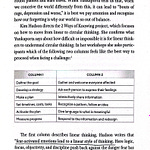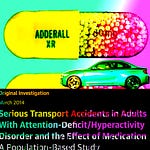This week I bring you: a podcast! (I meant to post this on the weekend, but I was driving 20 hours to Florida and that turned out to be, um, too ambitious.) I’ve been really excited to experiment with audio and thought that it might make some of these boring studies more interesting if I just read the good parts to you, so here it is, the first episode of the SlugPod. It’s a work in progress, so let me know what you think. Transcript with sources linked is below.
INTRO [a montage of social media clips]:
YOUTUBER 1: So, okay, should we get into talking about timeblindness?
YOUTUBER 2: Yes, let’s do it.
YOUTUBER 1: Okay, so just a quick definition, this is from Healthline, timeblindess is when one is not aware of the ticking of time and as a result, they often struggle to use time effectively.
TIKTOKER 1: If you are tuning in and you are neurotypical, timeblindness is the inability to percieve time normally.
YOUTUBER 3: It’s really the inability to percieve time. We don’t sense time in the normal fashion.
TIKTOKER 2: Very long periods of time can feel very short, very short periods of time can feel very long.
YOUTUBER 1: I’m consistently on time for my shows, you know, when it’s a professional thing I feel like something changes in my brain and I’m able to really focus and make it happen, but like, getting to appointments, meeting up with people, things that maybe feel a little less high stakes, I tend to run, prettty consistently, like five to ten minutes late.
TIKTOKER 3: Basically, all my life, I’ve felt like I’m running out of time. And I remember saying this all the time to the people around me like whenever I was stressed or would break down or whatever, my mom would be like, what’s wrong with you? And I’d just be like, [frantically] I’m running out of time and I just have so many things to do!
TIKTOKER 4: You guys wanna know about timeblindness? Here’s an example that just happened. So I saw that it was like 12:30 and I’m like, oh no, I have to film a video before one o’clock, when I’m supposed to post. And then my alarm for 1 went off, like 2 minutes later, cause I’ve been sitting, staring at the wall.
YOUTUBER 3: The point is, it just seems like time is slipping away from me always. That’s timeblindness.
[funky music interlude]
JESS: Timeblindness is all over social media, and it’s been bothering me for a while now, because even the laws of physics deny such a thing as objective time. Einstein taught us that time is relative. Clocks tick at different speeds depending on their elevation from sea level and the speed that they’re traveling. We perceive time to move slower or faster depending on our moods and attention spans. There’s no universal time to be blind to. It really depends how you’re measuring it and also, who’s doing the measuring.
What people mean when they say timeblind is that they struggle with clock time, a sort of timekeeping that came out of the Industrial Revolution because factories needed a way to manage their workers.
Maybe I’m taking it too literally though, because the way everyone uses it does tend to sound more like a metaphor. They’re expressing a sense of temporal disharmony, feeling out of step with the world around them.
An anthropologist named Mikka Neilsen did some interesting ethnographic work on ADHD culture, and she says that everyone has their own personal rhythm, and that societies have rhythms, too. She thinks ADHD can be seen as a desynchronization between your own rhythm and others.
I like this take on time perception, because it doesn’t suppose that one way is correct and the other is disordered. But timeblind? It’s a pretty strong value judgment dressed up in sciencey words, and I started wondering what kind of studies it was actually coming from.
Every single blog post about timeblindness I found on the first page of Google seemed to link back to one Youtube video, a 1 minute and 52 second clip of Russell Barkley giving a speech to parents of ADHD kids at a conference in 2009.
BARKLEY: ADHD is, to summarize it in a single phrase, timeblindness. People with ADHD cannot deal with time. And that includes looking back, to look ahead, to get ready, for what’s coming at you. So the individual with ADHD is kind of living in the now, and wherever the now goes, they are being pulled along by the nose. Doesn’t matter what your plans were, what your goals were, the now is more compelling than the information you’re holding in mind, and you will get pulled along by the now. You are timeblind.
Because, if we had to summarize in a single sentence, what is the purpose of the frontal lobe to humans? It is to organize your behavior across time in anticipation of what is coming at you. The future. ADHD, right, is at its heart, a blindness to time, or technically to be exact, it is a nearsightedness to the future. Just as people who are nearsighted can only read things close at hand, people with ADHD can only deal with things near in time.
The further out the event lies, the less they are capable of dealing with it. And this is why everything is left to the last minute, because they only deal with last minutes. That’s all they perceive, that’s all they deal with, that’s all they organize, too. And so their life is a series of one crisis after another, all of which were avoidable because people prepared, and they didn’t. They weren’t ready on time, in time, over time, with what they needed at that time [audience laughs] Note the word time. So ADHD is destroying the timing and timeliness of human behavior.
JESS: Oh the drama! Putting aside the profoundly condescending tone of this speech, what Barkley is saying is not just that ADHDers are timeblind, he’s defining ADHD as timeblindness.
This is something he started writing about in 1997 with a paper called Attention Deficit/Hyperactivity Disorder, Self-Regulation, and Time: Toward a More Comprehensive Theory, in which he attempted to redefine ADHD from a disorder of hyperactivity to a disorder of self-regulation and impulse control.
This paper was just theoretical, though, so it was time to go to Google Scholar. There I found quite a few studies Barkley had done on the subject, but the conclusions weren’t nearly as definitive as he likes to present them.
First, I need to explain how these experiments on time perception generally work. There’s a few different kinds of perception they’re trying to test: there’s time estimation, where a researcher will start and stop a stopwatch and a participant will have to verbally say how long the duration lasted.
There’s time production, where the participant is told, for example, how long a light should stay on and they have to estimate that duration without a watch, and there’s also time reproduction, where a researcher might turn a light on for a certain amount of time and then turn it off, and the participant has to try to do it themselves for the same amount of time. That last one takes the most mental energy, because it involves more attention and working memory.
In a 2001 paper, Barkley and friends summarize the existing literature like this:
..a number of studies have found deficits in time production and reproduction in ADHD children and adults, while most have found no deficits in time estimation… Others, however, failed to replicate these studies. Studies of adults with ADHD have likewise noted impaired time reproduction, but not estimation.
They conclude the paper by saying:
Greater errors on reproduction than on estimation tasks across studies may result from the time reproduction task being more taxing of attention allocation and working memory, as noted earlier. But this disparity in the results of the two paradigms may also suggest that the perception of time durations is not actually impaired in ADHD given that they can successfully estimate (verbally identify) durations.
This paper doesn’t say ADHDers are timeblind at all, it actually says the opposite? ADHDers can successfully estimate durations – this doesn’t support the popular notion of timeblindness, at least in the way people are using it online.
YOUTUBER 3: It’s really the inability to perceive time.
JESS: But that’s just one study, and it’s from 2001, so I dug a bit more. I found a meta-analysis from 2020 that starts by saying:
Given the current state of literature, the quality of time perception deficits in individuals with ADHD remains unclear.
So, doesn’t seem like they’ve exactly figured it out in the last 20 years? There appears to be a heated debate going on about time intervals, because some studies look at short windows on the scale of milliseconds, and others look at longer windows like 5, 10, or 12 seconds.
This study says that some researchers have found intact time perception for all kinds of intervals, while others found the opposite, and researchers debate what this means because different time intervals involve different brain processes. Long intervals require working memory to get involved, where the short ones, like milliseconds, don’t.
Allow me to pause and zoom out for a second. I’ve been reading this book called Your Brain Is a Time Machine by neuroscientist Dean Buonomano, and I’m not sure he’d agree with timeblindness? At least, neurobiologically, because he says that all our neurons evolved to tell time:
Asking which neurons or neural circuits within the brain tell time is a bit like asking which of the billion transistors in the CPU of your desktop are responsible for performing binary logic. They all are.
He also says that a true inability to keep time would mean being unable to understand language or music, which rely on timing down to hundreds of milliseconds. He writes:
…it is natural to also ask if specific disorders abolish people’s ability to tell time on the scale of around a second. The answer is no. There are no known neurological conditions that result in people losing their ability to appreciate the rhythm of music, and reproduce intervals in the range of seconds, and learn to blink at the right time in response to a tone. Nor should we expect there to be because different temporal problems are solved by different circuits within the brain.
I have a point here, I promise! I found a study from 2002 called Evidence for a pure time perception deficit in children with ADHD that claimed to have found:
a deficit in children with ADHD in their ability to discriminate between brief intervals of time which differ by only several hundred milliseconds.
But they weren’t asking these kids to keep the beat of a song, they were asking them to do a complicated computer-based task that took a ton of attention and has pretty much no real-world equivalent.
When people talk about timeblindness, they’re not talking about their ability to tell you which colored dot stayed on a computer screen the longest down to the millisecond, they’re talking about constantly running late to appointments. Experiments like this just aren’t super applicable to everyday life, and I’m hesitant to say that they’re evidence for very much.
That study, by the way, also said they found no evidence for deficits in longer intervals of time estimation like 5 and 10 seconds when compared to controls.
A 2009 study called Impulsiveness as A Timing Disturbance says some of the most consistent findings have to do with very short intervals, but results from time estimation and reproduction tasks are less consistent.
They also write:
ADHD children show poor inter-temporal choice in gambling tasks.
There’s one more kind of experiment I haven’t told you about. It’s called temporal discounting, and it’s basically a fancy word for delayed gratification? It also has a lot to do with gambling.
They ask participants if they would prefer a smaller amount of money now, or a larger amount of money later, and they use these experiments to test impulsivity and what they call “planfulness” or your ability to plan for the future.
The results of this test, though, are only relevant in a capitalist context. Sure, ADHDers may be worse at holding out to get more money later, but that only matters in a society that revolves around money. These experiments are also affected by the socioeconomic status of participants, with impulsivity being found more in people who have lower incomes.
That makes sense – if you’re poor, you literally can’t afford to hold out for the bigger reward. These experiments do not happen in a vacuum, and I think it’s a little bit sick that they’re testing children’s gambling abilities and calling it serious research, but such is the world we live in, I guess!
Another angle that’s been argued for the neurology of timeblindness, of course, is dopamine deficiency.
TIKTOKER 1: They’ve done a bunch of research on this and they have come to the conclusion that judgment of time is controlled by midbrain dopamine neurons. And as we all know, the hallmark of ADHD is that it is due to dopamine deficiency in our brain.
JESS: But this doesn’t make sense when we consider what Buonomano said about all our neurons evolving to keep time – there’s not just one neurotransmitter involved in time perception. One of the studies I mentioned earlier, the 2020 meta-analysis, addresses this theory.
Basically, the idea is that dopamine “tunes the activity of the internal clock”, so less dopamine would mean a slower clock. But they say that this doesn’t add up when you look at their findings, because that would mean ADHDers always overestimate time, which hasn’t been consistently found.
Back to my original question: is there scientific evidence for neurological timeblindness in ADHD? Based on the studies I found, it doesn’t look like it would be accurate to say so. There is evidence that some people struggle with specific experiments designed to test irrelevant tasks in a laboratory setting, but even that evidence is conflicted, with other studies finding the opposite or original studies not being replicated.
Barkley can say whatever he wants, because he’s a famous doctor and his word is taken as gospel. Barkley is non-specific when he talks about timeblindness, as if there is some universal time we are all running on, but what he’s really talking about is a struggle to keep clock time, to manage the temporal and developmental expectations of a capitalist world.
BARKLEY ON OLOGIES PODCAST: So, time management becomes a major deficit that just gets worse and worse with age because life becomes more time-sensitive with age. Three-year-olds don’t have to manage time. 30-year-olds are incredibly time-sensitive. Most of your day is filled with deadlines, schedules, promises, commitments, bills. Everything has a time tag on it.
He’s talking about responsibilities, to do lists, appointments – these are all outside pressures expected of us by society, and I think a lot of what’s being presented as a broken internal clock can actually be explained by working memory, attentional differences, and just plain overwhelm.
If you’re more sensitive to stimulus, you’re going to get overwhelmed faster and be less able to manage your time like other people do. But that doesn’t mean your perception of time is broken, it just means your brain is busy processing other things and getting tired faster. Traumatic experiences also alter time perception, which is something I don’t really see mentioned in the timeblindness discourse either.
There is no denying that ADHDers have a troubled relationship with time, but I don’t think calling it a broken internal clock is the only way we can conceptualize it. Disability scholars often refer to it as “crip time”.
In the book Feminist Queer Crip, Alison Kafer quotes a slang dictionary that describes crip time as “a flexible standard for punctuality”, and she explains that this isn’t always because of some individual deficit, but rather an effect of living in an ableist society.
She writes:
Operating on crip time, then, might not be only about a slower speed of movement but also about ableist barriers over which one has little to no control; in either case, crip time involves an awareness that disabled people might need more time to accomplish something or arrive somewhere.
Ellen Samuels, who originally wrote a now-famous disability studies piece called Six Ways of Looking at Crip Time, edited a special edition of the South Atlantic Quarterly Journal in 2021 that focused on crip temporalities. The intro to this issue talks about how COVID pushed more people into encounters with crip time:
With the advent of the COVID-19 pandemic, suddenly US academics and other white-collar workers who had previously resided in the sheltered space of the norm were thrust into the time-consuming, often frustrating space of crip time. They found themselves grappling with Zoom and other video chat technologies, struggling to balance exigencies of groceries and childcare with expectations of professional performance, running out of hours in the day and energy in their bodyminds to keep up. They remarked on social media that it was taking much longer to get anything accomplished, that they could not focus, that unstructured days indoors were strangely tiring, that instructional technologies themselves produced strange effects on their energy and motivation.
Many people came out of this experience with ADHD diagnoses and embraced the idea of timeblindness as an internal deficit, but I think the concept of crip time opens up more ways for us to think about how relational this truly is, how we are dis-abled by the clock and its standards for normalcy.
I’ve called it snail time or slugging, Marta Rose likes to call it spiral time, but I think instead of embracing a pathologizing concept like timeblindness or denying that we struggle against clock time, we can come up with our own ways of understanding these experiences that acknowledge how we’re affected by expectations and oppressions.
I specifically wanted to look at the scientific literature for this episode, but there are plenty of great cultural and philosophical arguments to be made against timeblindness, as well.
And just for the record, I don’t think we need scientific evidence to prove that our experiences are real — I am a chronically late person, and I have been my entire life. I almost got held back in high school because I had so many tardies and absences, so I get where everyone is coming from. I know what it’s like to feel like you’re always running out of time, but I also don’t think “timeblindness” is an objective thing, because ultimately, it’s being measured against what we consider to be “normal”.
TIKTOKER 1: Timeblindness is the inability to perceive time normally.
JESS: People are being told they have a broken internal clock, when really, it’s just a mis-fit between their body’s rhythms and the clock’s demands.
I think we’re going to have to explore the cultural and philosophical implications of timeblindness in a part 2. Let me know if you have questions, suggestions, or ideas about this, I love reading recommendations. Thank you for listening and stay sluggy, my brethren.














Is There Scientific Evidence for Timeblindness?